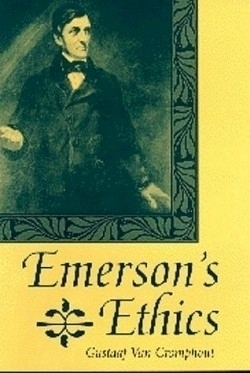
Emerson's Ethics
A central question posed by Ralph Waldo Emerson throughout his life was “How shall I live?” So argues Gustaaf Van Cromphout, Professor of English at Northern Illinois University, who points out in this important study that, surprisingly, Emerson is rarely taken seriously as a philosopher. As a poet, essayist, lecturer, even reformer, yes; but as an ethicist or moralist, he has been considered at best unsystematic and impulsive. Even Emerson’s popular image as a spouter of handy cracker-barrel aphorisms runs up against an equally persistent impression that the Sage of Concord was a rather silly airheaded mystic.
Van Cromphout shows that, from his college essays to the end of his career, Emerson was immersed in philosophy, from the ancients to the moderns, with particular affinities with Plato and Kant. He creatively adopted the ideas of other thinkers and contributed fresh insights into key ethical issues. Emerson was less interested in “normative ethics” (i.e., this is right, that is wrong) than in “metaethics” (“questions
about ethics”). In response to modern threats to traditional systems of belief and the integrity of the self—including democracy, materialism, “mass culture, … urbanization and industrialization”—Emerson was concerned not with asserting “mere individuality” but with defining the self as a project of endless change and growth. And though he conceived of the Self and Society as oppositional forces, he knew that the former made no sense without the latter—thus he respected the autonomy of others and was committed to social reform.
An enduring misconception about Transcendentalism is that it endorsed otherworldly idealism. But as this book shows, for Emerson “the good and the beautiful” are only found in the world. “Experience” is a basic term and concept for Emerson because, Van Cromphout stresses, he seeks to replace a deadening sense of routine with an intuitive, spontaneous response to “everyday life.” This capacity for childlike surprise is no elitist philosophical pursuit but an essential opportunity for “quality of human life” in an “egalitarian world.” “Nature”—an “other” with its own inherent worth as well as a projection of the mind—becomes for Emerson an ethical “norm.” Language likewise is profoundly moral. Literature must be “rooted in personal experience” in order to be truly “universal” or it is merely cant, for Emerson is part of a tradition of “edifying” writers who aim to inspire and create joy.
This is not, obviously, a light subject. But Van Cromphout brings to it not only enormous learning (including fluency in German, the language of so many crucial literary and philosophical sources for Emerson’s generation) but also modesty, generosity toward previous scholars, and, above all, an ability to make complex ideas accessible in a style that is as jargon free as the subject permits. (These same superb qualities mark his previous book, Emerson’s Modernity and the Example of Goethe [Missouri, 1990], which is at once a study of what Emerson found of value in a writer of heroic proportions; an inquiry into the nature of literary influence; and a remarkably clear overview of Romanticism itself.) Van Cromphout quotes Emerson’s belief that the most valuable books put their readers “in a working mood”—that is, they provoke us to our own “thoughts and actions.” Emerson’s admirers will find that Emerson’s Ethics is that kind of book.
Reviewed by
Wesley T. Mott
Disclosure: This article is not an endorsement, but a review. The publisher of this book provided free copies of the book to have their book reviewed by a professional reviewer. No fee was paid by the publisher for this review. Foreword Reviews only recommends books that we love. Foreword Magazine, Inc. is disclosing this in accordance with the Federal Trade Commission’s 16 CFR, Part 255.
